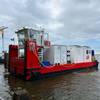Roughly one in two Greek shipping companies (56 percent) would consider relocating their administrative bases abroad, according to the findings of an Ernst & Young study.
The results of the study titled “Repositioning Greece as a Global Maritime Capital” warn of a possible exodus by the country’s shipping enterprises at a time when global maritime centers are interested in attracting Greek shipowners.
The Greek shipping industry has weathered the storm and the Greek-owned fleet, with over than 5,272 vessels and a value approaching USD 86 billion, remains the largest in the world, in terms of tonnage capacity and has enhanced its dominant position in terms of value, in many of the sector’s segments.
The shipping industry is by far the most extrovert sector of the Greek economy. The inflows from shipping activities account for approximately 6.5% of Greek GDP and also have a substantial indirect multiplier effect on the Greek economy through cross-industry organizations gathering all or part of the maritime subsectors.
Over the coming years, competition among the major global maritime centers will intensify. As the shift of global trade towards the Far East continues, it is very likely that in the next twenty years none of the top maritime capitals of the world will be located in Europe.
London, Hamburg, Oslo and Rotterdam, each with its own strong competitive advantages, are struggling to emerge as the leading maritime center within Europe. Greece (Piraeus) will need to work hard if it is to retain or strengthen its standing as a maritime capital in the world.
Our survey among leading members of the Greek shipping community sheds light on the shipping industry’s perceptions of the competitive advantages and disadvantages of Greece as a basis for ship management functions, the attractiveness of competitive maritime centers and the ways in which the competitiveness of the Greek maritime cluster could be improved.
The related issue of the perceived advantages and disadvantages of the Greek flag is also examined.
"Our survey revealed that human capital, the seamanship, along with geographic location and obviously, ship-ownership, are the main competitive advantages of Greece as a ship management center, while the lack of a stable regulatory environment governing the cluster, lack of access to financial institutions, poor infrastructures and tax issues are the main disadvantages."
As a result, more than half of the respondents would consider a potential relocation of their ship-management function outside Greece, with Singapore, London and Dubai identified as the most attractive alternative destinations. Three out of four respondents singled out Singapore as the likeliest leading maritime center within the next ten years. Cyprus is also emerging as a close by to Greece, competitive maritime cluster.
In spite of the perceived disadvantages of Piraeus and the growing attractiveness of competing maritime centers, the Greek shipping community remains confident about the role of Greece as maritime center in the coming years and believes that its enhancement would strengthen their business.










